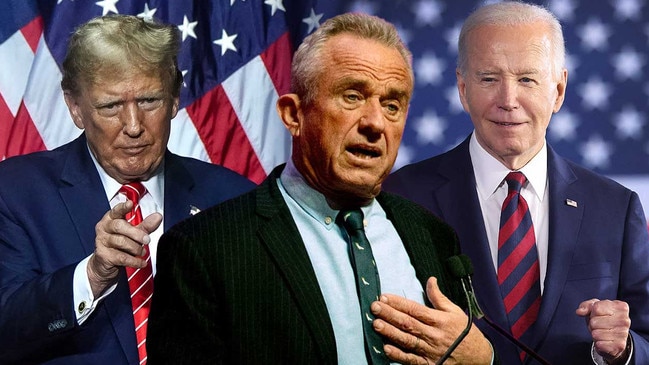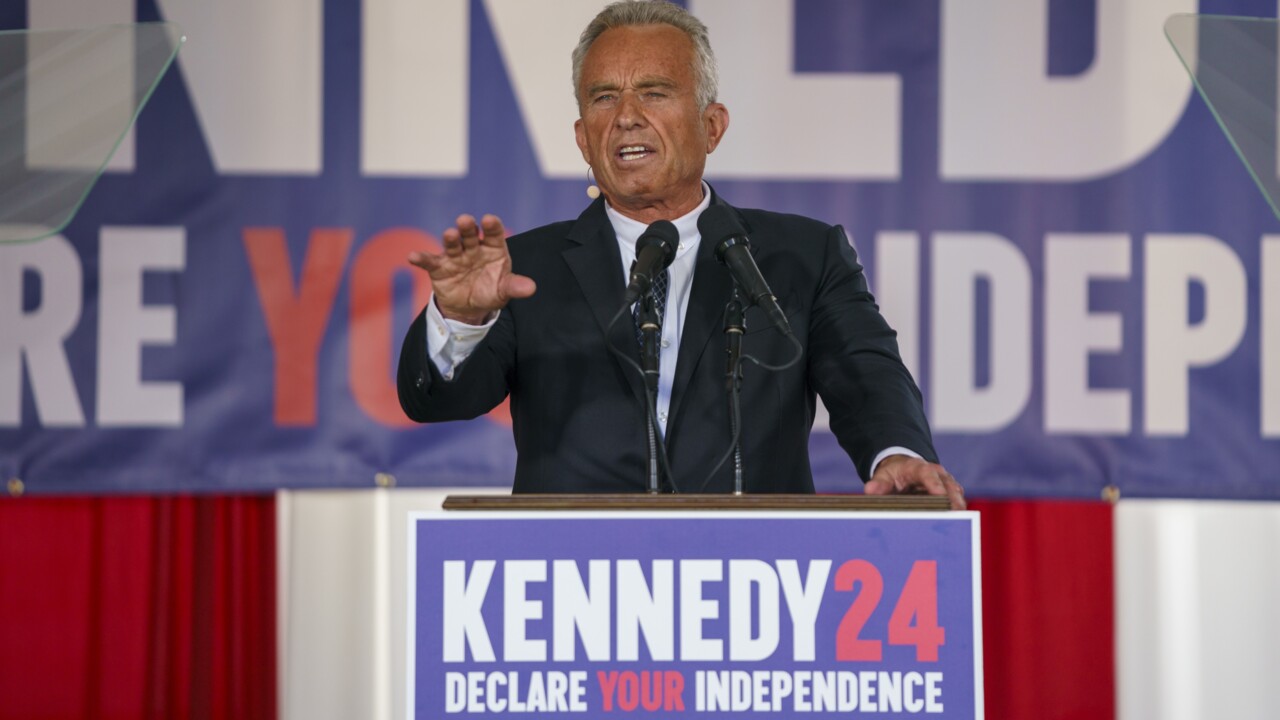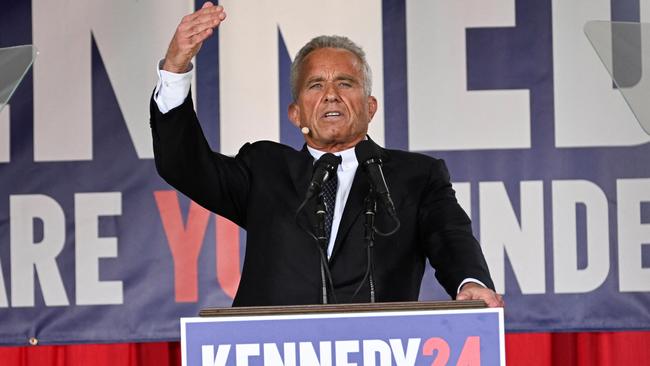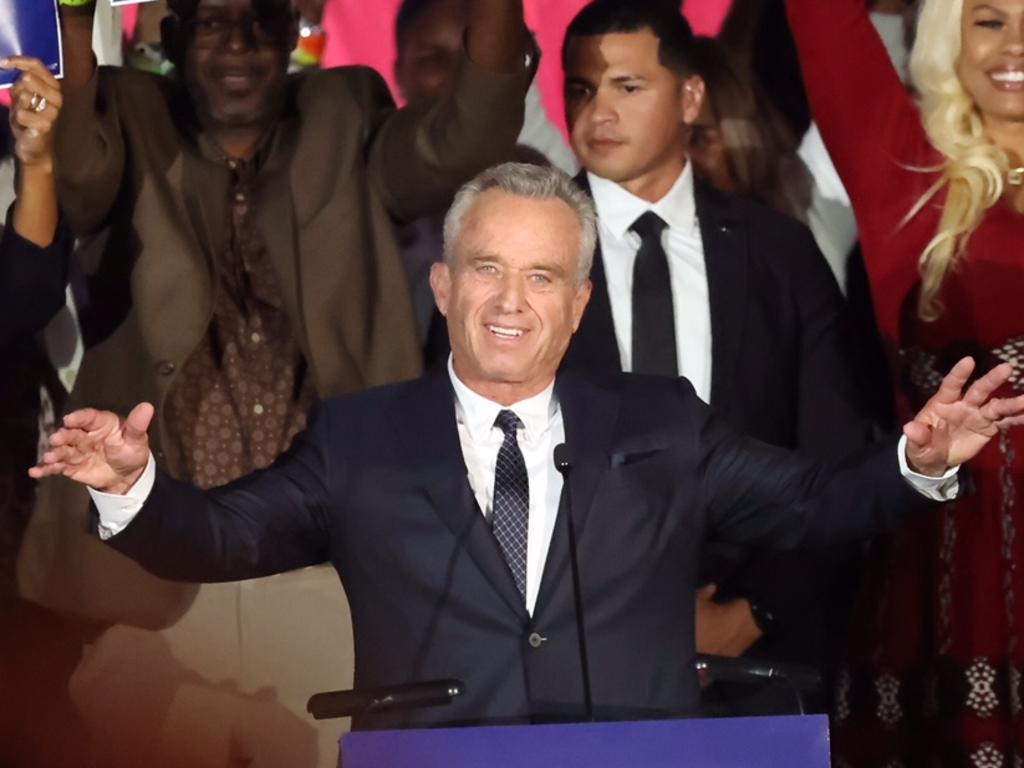
But the reality, if there’s any silver lining, is that November won’t be like 2016 or 2020, contests with only two candidates who loathe each other. For the first time since 1992 a third-party candidate with significant name recognition has thrown his hat into the ring, guaranteeing a much more interesting outcome.
Perhaps there’s no time in US history, in the wake of the Covid upheaval, high inflation and widespread despair about the nation’s direction, when the potential for a third-party candidate to wound, if not smash, the Democrat-Republican stranglehold on US politics has been so propitious.
Large majorities of Americans routinely tell pollsters they don’t want the rematch, leaving open the possibility that on election day, faced with three recognisable names on the ballot for president, they tick the box belonging to Robert F. Kennedy, nephew of president John F. Kennedy and son of senator and attorney-general Robert F. Kennedy, who was assassinated in 1968.
“The RFK Jr factor is something I think people are underestimating,” diehard Democratic Party activist and author Van Jones said last week, shocking his CNN panellists who, like much of the mainstream media in the US, have more or less ignored Kennedy’s candidacy.
The truth is the Democratic Party may come to rue treating a scion like a leper after he launched his campaign to run against Biden last year, compelling the now 70-year-old Kennedy to announce an independent bid for the presidency. “Show me an issue they felt strongly about that I don’t agree with them on,” Kennedy said this week, dismissing the now cliched criticism that he has disavowed the ideals of his father and uncle, and betrayed the party. “I’m reviving the values of the party, the party that has shifted away from its traditional values.”
He’s not wrong. Kennedy’s scepticism of the power of big American corporations over government, especially food and pharmaceutical oligopolies, his anti-war stance and fear of the national security and military-industrial complex, and passionate advocacy for free speech, hark from a Democratic Party of the 1960s.
Months ago few in the political class believed as an independent he could jump through the high hoops required to satisfy the byzantine state-based requirements for ballot access, which in effect entail gathering many thousands of verified signatures, including 75,000 in California, a task that costs tens of millions of dollars.
But in the past few weeks Kennedy’s campaign team has announced he’s likely to appear on the ballot in Utah, Hawaii, New Hampshire, South Carolina and, most worrying, critical swing states Arizona, Georgia and Michigan, which prompted Jones’s concern.
Kennedy remains adamant he will get on practically all state ballots, and if he doesn’t the US Libertarian Party, which already has ballot access in almost all states, has said publicly it is open to his becoming its candidate.
For all the talk of saving democracy, the two major political parties make it fiendishly difficult for anyone outside these two parties to stand for election.
On Thursday, Kennedy’s campaign team said he would be announcing his vice-presidential pick on March 26 in Oakland, California, a prerequisite for gaining ballot access in some states.
The New York Times speculated this week he was on the verge of picking superstar NFL quarterback Aaron Rodgers. Indeed, the domain name kennedyrodgers.com was registered last week, the paper said. Unlike most sports stars Rodgers has weighed into politics periodically, espousing the same scepticism of Covid-19 mandates, especially compulsory vaccination, as Kennedy.
In a nation obsessed with celebrity, Rodgers’ advocacy of Kennedy’s candidacy, via seven million followers on X and Instagram, may worry the Washington establishment. Kennedy is polling much better than his mainstream media appearances would suggest: a December Quinnipiac poll put him at 22 per cent nationally compared with 38 per cent for Biden and 36 per cent for Trump. He scores even better among independent voters under 35 and does better in swing states such as Arizona and Georgia.

“If 2024 turns into a Joe Biden v Donald Trump rematch with Robert F. Kennedy Jr as an independent, battleground state voters currently say it would be a very close contest, with Trump at 35 per cent, Biden 33 per cent and Kennedy 24 per cent,” Siena College Research Institute director Don Levy said in November last year, speaking of his organisation’s latest poll.
Both Republican and Democrat political strategists claim Kennedy takes more votes from the other side, but his eclectic mix of positions – pro-abortion and pro-free market, for instance – makes it difficult to predict.
“The Democrats are frightened that I’m going to spoil the election for President Biden,” Kennedy repeatedly says on the campaign trail. “The Republicans are frightened that I’m going to spoil it for President Trump. The truth is, they’re both right.”
“We’re almost spending equivalent of the defence budget on debt … No one is talking about chronic disease … We’re paying more for treating diabetes than the entire defence budget,” he told Fox News this week. He’s right. Neither Trump nor Biden talk about Americans’ declining health or the diabolic fiscal situation, preferring hysterical fearmongering about the other side that most Americans are understandably sick of.
To be fair, political betting markets don’t believe his polling numbers, giving Kennedy barely a 5 per cent chance of becoming president come November, behind Michelle Obama and California governor Gavin Newsom, according to the RealClearPolitics average of odds offered by six major bookies. Hillary Clinton was a laydown misere in 2016 to become president, according to those same markets.
But the more interesting possibility is little discussed: if Kennedy can win just a handful of swing states, as southern Democrat George Wallace did in 1968, he could deny Trump and Biden a majority of 270 electoral college votes. If no candidate can achieve a majority in the electoral college, obscure rules in the 12th amendment of the US constitution take over. In this case, democracy would take a back seat.
‘Americans are tired of these dire warnings that to preserve democracy itself you better vote for our guy.’
Then, the incoming House of Representatives would choose the president and representatives from each state would get one vote each. That is, California and tiny South Dakota would have the same say.
Members from each state would have to work out how they were going to vote, and whichever candidate secured to 26 votes, a majority of states, would become president. Crazy, you may think, but they are the rules.
Such contingent elections have occurred twice in US history, in 1825 and then in 1837. One can imagine the extraordinary horse trading that would occur between election day in November, and the congressional vote the following year as the new members took their seats.
If Biden and Trump congressmen and congresswomen couldn’t bear the thought of their loathed opponent becoming president, it’s not impossible to think Kennedy, who remains palatable to many members of both parties, could be the candidate the 50 state representatives ultimately settled on.
Even if not, Kennedy could bargain his way into a senior position in either administration.
Kennedy’s supporters have deep pockets, too.
Democrat strategist David Axelrod in October openly decried the possibility that Elon Musk – who has denied he would be backing Trump, after months of boosting Kennedy on social media – could become one of Kennedy’s biggest financial backers.
Kennedy’s main political action committee, American Values 2024, shocked the political establishment last month by forking out $US7m ($10.5m) for a 30-second advertisement, a spruced-up version of one of his uncle’s TV advertisements in the 1960 campaign, during the Super Bowl.
It turned out most of the funds ultimately came earmarked from Nicole Shanahan, a San Francisco Bay Area lawyer once married to Google co-founder Sergey Brin. “It seems like a great opportunity to highlight that he’s running for president,” said Shanahan, who also provided some creative guidance. Billionaire Jack Dorsey, who co-founded Twitter, also has endorsed Kennedy.

Kennedy’s response to Biden’s State of the Union address last week was a study in eloquence and sincerity in comparison to the President’s, and Trump’s for that matter, trademark hyper-partisanship and fearmongering.
“Our nation has become artificially divided by political forces that can survive only when we the people are at war with each other,” Kennedy said in a widely acclaimed video.
“We recognise that the same techniques of manipulating fear are being used by elites today to corral us into voting for one political candidate or the other. Americans are tired of these dire warnings that to preserve democracy itself you better vote for our guy.”
He’s right. As George Washington recognised in his final address, political partisanship is killing the US, tearing its constitution apart. Whether enough Americans realise that yet remains to be seen.
But for many, Kennedy may be a refreshing alternative to another four years of hate-filled rhetoric that serves mainly to distract the populace from the serious economic and social problems the US is facing.






A weary, polarised American electorate is coming around to the near certain prospect of a Joe Biden v Donald Trump presidential rematch in November after the two political warhorses obtained enough delegates to guarantee their nominations by their respective parties this week.